In the past two years, significant progress has been achieved in the Chypre Peace Process on many of the negotiation dossiers. However, security arrangements continue to be an impasse for the island’s reunification. After more than four decades of peace negotiations, the security dossier is still locked in a zero-sum dynamic, where one side’s gain is the other one’s loss. For this reason, in October 2016, with the objective to support the Cyprus Peace Process, the Centre for Sustainable Peace and Democratic Development (SeeD) started implementing the “Security Dialogue Initiative” with its international partners, Interpeace and the Berghof Foundation.
The project has sought to find innovative solutions to overcome the deadlock on security, so that solutions can be found that make both the Greek Cypriot and Turkish Cypriot communities feel simultaneously and equally secure. As previous research has shown, both communities give first priority to security matters. Therefore, reaching an agreement on the security dossier is not only crucial to achieving a peace deal but also crucial to receive public endorsement of any Peace Plan that will be put to referenda in both Cypriot communities and ensure that ‘the day after’ a transition to a new state of affairs will be socially and politically viable.
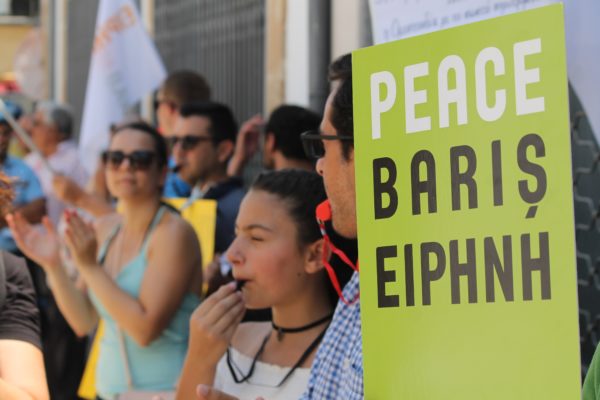
Pro-peace rally in Nicosia, Cyprus. Photo credit: SeeD
A locally owned and internationally informed dialogue on security
The “Security Dialogue Initiative” is a participatory dialogue process that includes the involvement of local stakeholders across the island and international experts, with the objective to identify security options that are acceptable to all Cypriot communities and the international security stakeholders (Greece, EU, Turkey, UK and others).
In the first phase of the project, SeeD undertook a comprehensive bottom-up threat and risk assessment in order to turn the dialogue on security on its head and start from people’s fears rather than political solutions. Based on the findings, SeeD followed a participatory research and dialogue process, involving international experts, to develop a proposed security architecture for Cyprus that would respond to these real and perceived threats.
The second phase of the research process subjected the proposals thus developed to rigorous testing. On the one hand, a public opinion poll[1] was conducted to assess the acceptability of the options generated and, on the other hand, the proposals were vetted by another set of experts as well as focus groups (representative of the general public) to assess their viability.
The third phase of the research focused on refining the proposed New Security Architecture as well as transitional arrangements enabling a phased transition from an agreement to the implementation of the architecture.
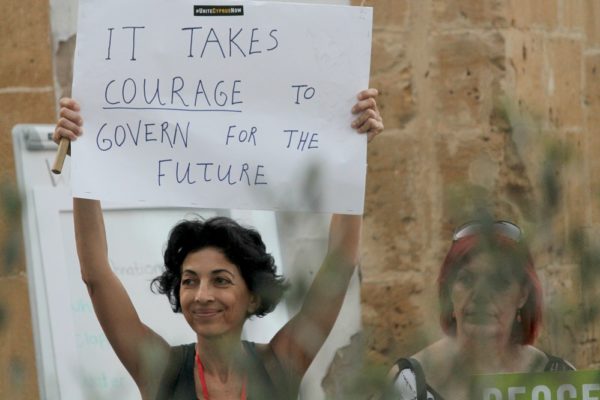
Pro-peace rally in Nicosia, Cyprus. Photo credit: SeeD
Ways to overcome the impasse on security
The proposed Security Architecture is based on the following principles:
1) The security architecture should effectively respond to actual and perceived threats. At present, the over-emphasis on international security guarantees acts as an obstacle to identifying institutions, mechanisms and processes that would enable a united Cyprus to manage its security self-sufficiently. In order to break out of the zero-sum dynamic, negotiators should take into account everyday security challenges faced – or expected to be faced in the event of a solution – by both Cypriot communities. Some of these challenges include: the lack of commitment and effectiveness of federal institutions, tensions and violence around property and territorial disputes, biases of police and judges in favor of their own community, assaults by extremists and economic hardship caused by the high cost of a settlement.
2) Preventive remedies are no less important than reactive remedies. Current conversations primarily focus on reactive remedies and hard security, such as the number and deployment of troops, military guarantees etc. However, such mechanisms are heavily focused on how worst-case scenarios can be managed, instead of how they can be prevented from transpiring. To more effectively address threats, a holistic perspective is called for, which would integrate both preventive/‘soft’ and reactive/‘hard(er)’ security instruments.
3) Building endogenous resilience should be the ultimate goal. A settlement can be sustained only if a united federal Cyprus develops its own internal capacities to deal with stressors and threats, as an endogenously resilient state. Resilience of both society and institutions needs to be reinforced, so that in the event of system stressors or shocks, such as incidents of deadlock, perceived injustice or violence, state and societal institutions respond swiftly, effectively and fairly. In this regard, SeeD has also developed recommendations for a transition period, during which state and societal institutions could be developed and strengthened, building confidence in the implementation, functionality and sustainability of an agreed settlement, to ultimately achieve endogenous resilience for a united Cyprus. This will be achieved through 1) the creation of civic loyalty to the federal state and its institutions rather than just ethnic loyalty to one’s Community, without trivializing ethnicity and 2) international support, to ensure the viability of a settlement in this transition period. Nonetheless, the ultimate goal should always be a Cypriot state that is resilient and self-reliant including with regards to security matters – and this is a point that all Cypriots can agree on.
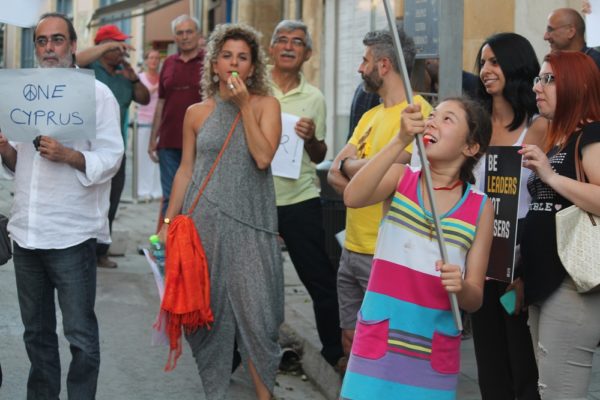
Pro-peace rally in Nicosia, Cyprus. Photo credit: SeeD
Informing the peace talks
On June 28, the Geneva conference on Cyprus has resumed in Crans Montana, marking the latest attempt to secure progress towards a historic agreement on reunifying the island. Leading up to the conference SeeD has been engaging stakeholders that will be parties to the conference to share their recommendations and detailed research findings, thus making an informed and important contribution.
For further information read the New Security Architecture proposal ici.
[1] The public opinion poll had a representative random sample of 3000 people, 1500 from each community. The key purpose of the second phase is to test the viability and acceptability of alternative security formulas.
With over 20 years of experience working in the Région Somali, Interpeace and its partner organizations have supported and advanced state-building and peacebuilding processes. Our work has helped transform dialogue into action in the interest of communities across the region, by convening a wide range of stakeholders in neutral political spaces. Interpeace’s long term institutional partners, the Academy for Peace and Development (APD) in Somaliland and the Puntland Development Research Center (PDRC) in Puntland, have ensured local ownership in our peacebuilding approach.
The Somali Programme consists of two main and interconnected programmes – Pillars of Peace and Democratization. With the objective to build social cohesion, the Pillars of Peace Programme, established in 2009, seeks to strengthen the ability of grassroots communities to connect and provide input into evolving governance structures. The Democratization Programme, ongoing since 2011, builds on the work of the Pillars of Peace Programme, focusing on state reconstruction, aiming to increase public trust and strengthen democratic institutions. Together, these programmes have played a major role in building bridges between local communities and their leaders at all levels.
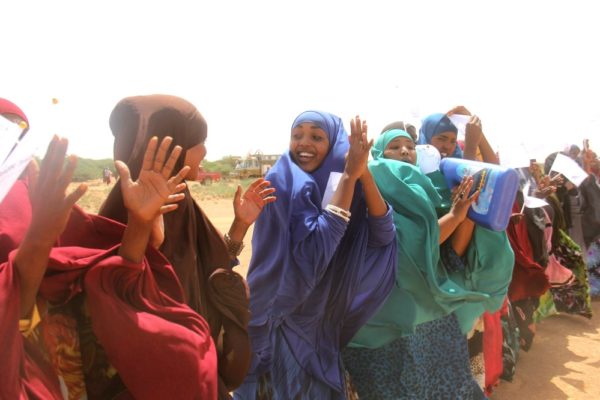
Puntland. Photo credit: PDRC
Over the past decade, Interpeace and its Somali partners have demonstrated continued relevance and resilience in the region, being part of several key achievements. In 2010, Interpeace supported Somaliland’s National Electoral Commission as its lead international technical advisor for the successful delivery of the presidential elections. APD played a key civil society role at every level of the process, including political mediation and strengthening electoral laws. In 2012, Interpeace supported the Transitional Puntland Electoral Commission in the process leading up to the ratification of a revised Puntland Constitution. Building on this basis, it worked with the Commission to lay a strong foundation from which to pursue local council elections. In the meantime, PDRC made important contributions to voter education, media preparedness and managing political sensitivities. In 2014, Interpeace began its re-engagement in the south and central regions of Somalia through the establishment of a Peacebuilding Team in the capital of the Jubaland State of Somalia. As of December 2015, the Interpeace Peacebuilding Team (IPT) has grown to include an office in Mogadishu, with a capacity to operate across south and central Somalia.
Interpeace also worked closely with key actors in the Federal Government of Somalia and the federal states, providing facilitation training to civil servants across different ministries to assist in the development of key dialogue and consultation processes around the 2016 election process and wider state-building initiatives. In Somaliland, Interpeace’s partnership with the National Electoral Commission has provided significant support to the voter registration process. And in Puntland, Interpeace worked together with PDRC to facilitate the political process leading up to the resumption of the democratization process, through the launch of a new electoral commission.
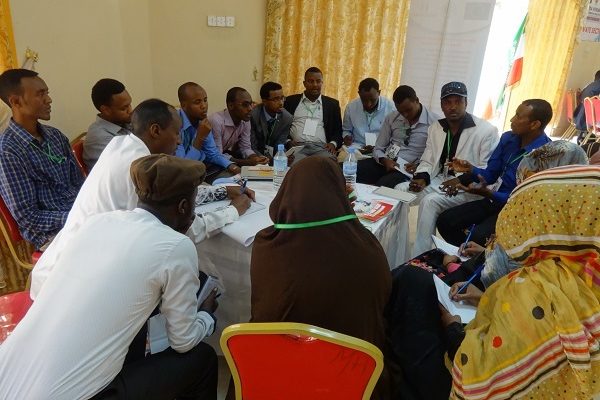
Somaliland. Photo credit: SONYO
Throughout the past two decades, we have engaged in a variety of processes to mitigate conflict. Some examples include APD’s land management process, which aims to develop legal, policy and social frameworks to prevent and resolve land-based conflict and PDRC’s Rako reconciliation process, which has given youth and women a primary role in resolving long-standing local conflict. Moreover, using communication tools such as the Mobile Audio Visual Unit (MAVU), which uses film to reach rural and marginalized communities that have limited access to information, we have promoted engagement and consultation with thousands of citizens in the region.
In the next five years, Interpeace and its partners will seek to reinforce the capacity of Somali society, both the government and citizens, to strengthen and ingrain democratic culture and practices that underpin state-building, and promote sustaining cohesion between Somalis at the local, regional and federal levels. This will be achieved by supporting effective and legitimate governance, promoting citizen ownership of democracy and peacebuilding, and enhancing the contribution of women and youth to peace and democracy.
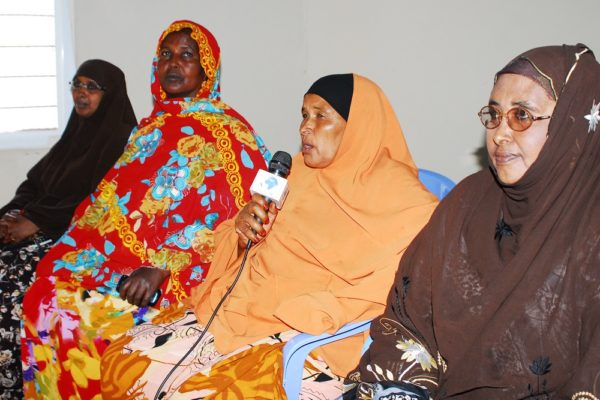
Somaliland. Photo credit: APD
Timor-Leste, one of the youngest democracies in the world, has faced numerous challenges in its journey to build sustainable peace. Recognized as an independent country fifteen years ago, in May 2002, it has faced serious political crises, violence, unemployment, and land disputes. Despite these problems, the Timorese have reached important achievements in the past five years: growth in their economy, a decrease in child mortality rates and peaceful elections. However, the Timorese are still faced with the consequences of decades of social turmoil and one of the biggest challenges that remain are food security issues. On May 30, 2017, the Centre d'études pour la paix et le développement (CEPAD) in partnership with Johns Hopkins University, successfully launched a report called, “Timor-Leste Strategic Review: Progress and Success in Achieving the Sustainable Development Goal 2”, which addresses the need to improve nutritional outcomes in the country.
Research has shown that there is a clear link between conflict and food security issues. Tackling the root causes of conflict in fragile countries therefore involves addressing these challenges. The United Nations Food and Agricultural Organization (FAO) has made food security a priority and Sustainable Development Goal 2 seeks to “end hunger, achieve food security and improved nutrition, and promote sustainable agriculture.”
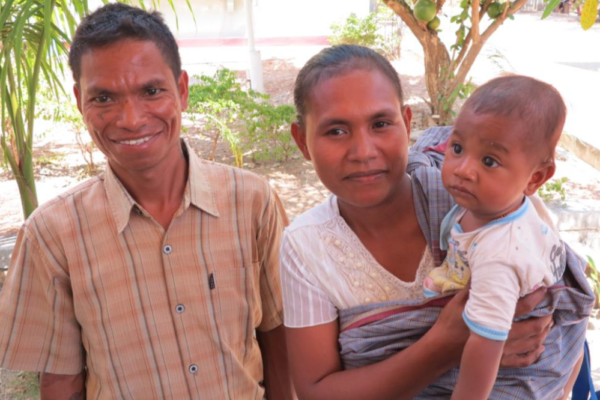
A Couple in Oecusse, Timor-Leste. Photo credit: WFP Camila Urbina-Escobar
Timor-Leste is one of the countries with the highest rates of chronic undernutrition in the world. Children and women are the most at risk of malnutrition. In 2013, 38% of children were underweight, and more than half of the nation’s children under five years old are stunted in bodies and brains. In the same year, 24.8% of women between 15-49 years old were underweight and 40% were anemic. Between 2013 and 2015, 26.9% of the country’s population experienced hunger. Moreover, Timor-Leste’s agriculture system does not produce enough food to feed the population. Factors that are contributing to this problem are unsustainable methods, poor soil fertility, land ownership issues, and farmer’s low motivation due to low profits. Additionally, the Timorese are experiencing the effects of climate change including higher temperatures and longer dry seasons.
Through the support of former President Ramos-Horta and the Bishop of Dili, a Strategic Review was undertaken by our local partner in Timor-Leste, the Centre of Studies for Peace and Development (CEPAD) and Johns Hopkins University, to determine what needs to be done to achieve Sustainable Development Goal 2 (SDG2). The Strategic Review portrays the nutrition challenges in Timor-Leste and is a mechanism that can help the government set priorities in the actions and policies implemented in the country to achieve SDG2. Moreover, it can help stakeholders develop programs to end hunger and achieve food security.
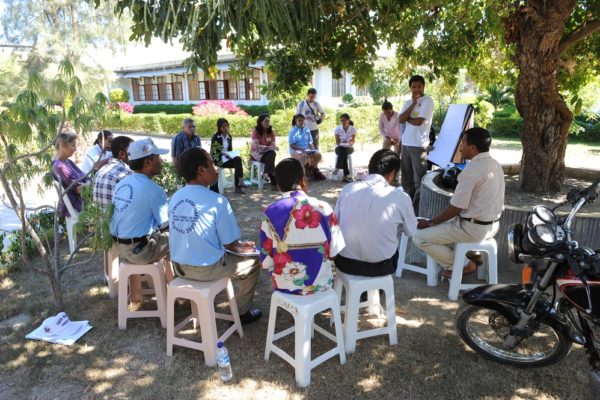
Timor-Leste. Photo credit: Steve Tickner
The Strategic Review was developed through a participatory research process, which initiated with a compilation of the most recent information and data about Timor-Leste’s nutrition, agriculture and food systems. Afterwards, the research team conducted a nation-wide consultation process with members of the government, international organizations, nongovernmental organizations, civil society organizations, as well as led community consultations. The data gathered was then analyzed to write recommendations on how Timor-Leste can progress towards achieving goal SDG2. Recommendations include ensuring national social protection programmes, improving operations and nutrition of the nationally owned School Meals Programme, improving agricultural productivity by promoting agroforestry, improving spices and coffee production, investing in women farmers, etc.
Since 2007, Interpeace has been working with CEPAD, supporting peacebuilding processes in Timor-Leste, establishing initiatives to help break cycles of violence and help create a climate where the Timorese can identify and address priority issues in non-violent ways. We celebrate CEPAD’s work and are proud of the successful launch of the Strategic Review to achieve SDG2 in Timor-Leste.
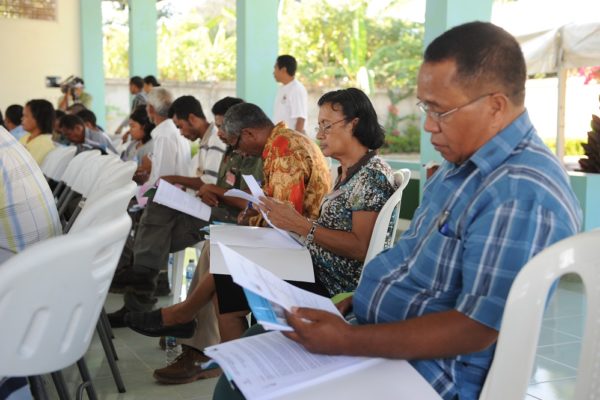
Timor-Leste. Photo credit: Steve Tickner
To read the full report visit the following link:
Timor-Leste Strategic Review: Progress and Success in Achieving the Sustainable Development Goal 2
The current round of peace talks in Chypre has advanced further than any previous round has since the division of the island in 1974. This is a significant achievement of the Greek and Turkish Cypriot leaderships in the UN-facilitated talks – whether they are now able to reach a final agreement or not. Interpeace has been engaged in support of peace in Cyprus together with local actors since 2009 and has also been contributing to these latest efforts at reaching peace.
In line with its approche Track 6 of linking the grassroots (Track 3), civil society (Track 2), and high-level political actors (Track 1), Interpeace has supported the conduct of participatory polls to inform the peace talks and the public debate. The hallmark of participatory polls is that the questionnaires are designed together with the stakeholders, which increases the results’ relevance and uptake with decision-makers, anchoring high-level political processes in attitudes of the public. Interpeace and its partners have already carried out such polls in Cyprus previously as well as in Somalia.
Over the course of the last five months, the participatory polls conducted in Cyprus in partnership with Dr Colin Irwin of the University of Liverpool and Cypriot stakeholders have helped identify common ground between the two Cypriot communities on thorny issues in the peace talks, such as territory, governance, and security.
In addition, the polls have revealed that reciprocal confidence-building measures between the two communities are of critical importance to build trust and support for the prospect of peace. The polls have offered precise information about which confidence building measures have the greatest chance of bringing the communities closer together.
In order to inform and inspire the public debate on peace in both parts of the island, these polls are now being published in Cypriot news outlets and on www.peacepolls.org in English, Greek, and Turkish.
A further component of Interpeace’s engagement in Cyprus is its continued partnership with the Centre for Sustainable Peace and Democratic Development (SeeD). In recent months, SeeD has been implementing a research and dialogue process to develop and share innovative options for addressing the security dossier in the Cyprus peace talks. This Security Dialogue Initiative has generated proposals for a new Security Architecture, which have informed the peace talks and the public debate in both communities. They are available from SeeD’s website www.seedsofpeace.eu.
Signing the peace agreement in Colombia put an end to one of the world’s longest armed conflicts and marked the beginning of a process to build lasting and sustainable peace, which requires the involvement and commitment of all public institutions and society as a whole. The National Police of Colombia is a key institution in this peacebuilding process, due to its dual role to guarantee security and peaceful coexistence, and at the same time to help prevent violence.
On April 2016, the Colombian National Police created the Police Unit for Peacebuilding – UNIPEP –to contribute to the post-conflict scenario in the country. This visionary commitment took place long before the agreement was signed, in order to define its institutional responsibility towards the implementation of the Final Peace Agreement. From that moment on, a collaborative work began between UNIPEP, Interpeace's Regional Office for Latin America and partner organization Alianza para la Paz., with the support of the governments of Switzerland and the Netherlands. This alliance gave rise to the Modèle de consolidation de la paix de la police nationale,, launched on May 3, 2017.
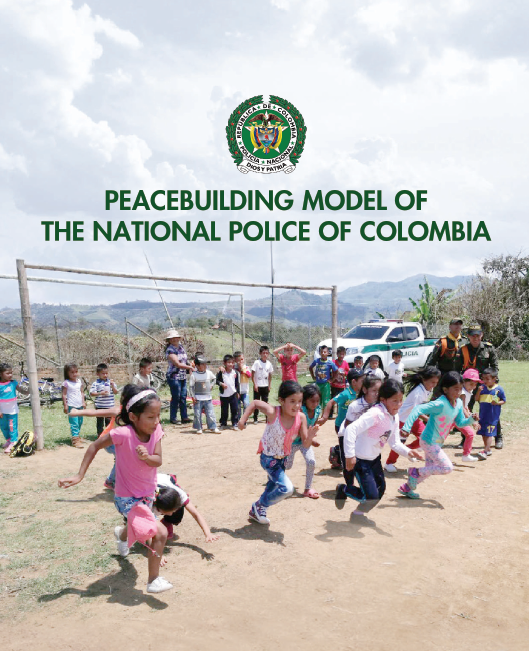
Interpeace in Colombia
Building peace in Colombia, entails a significant challenge for the National Police to transform itself into an institution that guarantees the necessary conditions for the exercise of all rights and freedoms. From a peacebuilding perspective, signing an agreement that ends the conflict is only the first step in a long process to build lasting peace.
Therefore, in order to adjust to the new challenges derived from the post-conflict scenario, the National Police of Colombia have transitioned to fostering and enabling a peaceful transformation of conflicts, as part of its institutional policies. For this reason, supporting the Colombian National Police was strategically valuable for Interpeace and Alianza para la Paz.. Working with the Colombian National Police contributes to the non-recurrence of armed violence and reduces the emergence of new forms of violence and criminality.
Peacebuilding Model
The Peacebuilding Model is the result of a broad and participatory consultation process at all levels of the police, where the responsibilities and the commitments of the institution were identified based on the six points of the Final Peace Agreement. Through this systematization process, the guidelines that the Police should implement were established to ensure a compliance with their responsibilities towards the Final Peace Agreement and their contribution to building lasting peace. The Model has an Implementation plan that contains 26 projects, 22 actions and 12 recommendations, which will be deployed at the institutional level of the Police, the defense sector (military forces) and with other State institutions linked to the implementation of the Final Peace Agreement.
The Peacebuilding Model of the National Police lays the groundwork for a long-term transformation process aimed at adapting the institution to the new challenges posed by the post-conflict scenario. Therefore, once the Model has been institutionalized, Interpeace and Alianza para la Paz., will accompany UNIPEP in the challenge of monitoring and evaluating the effective implementation of the projects, actions and recommendations of this model. This also implies the technical support for the deployment in the defense and interinstitutional sectors, during the implementation of the Peacebuilding Model.
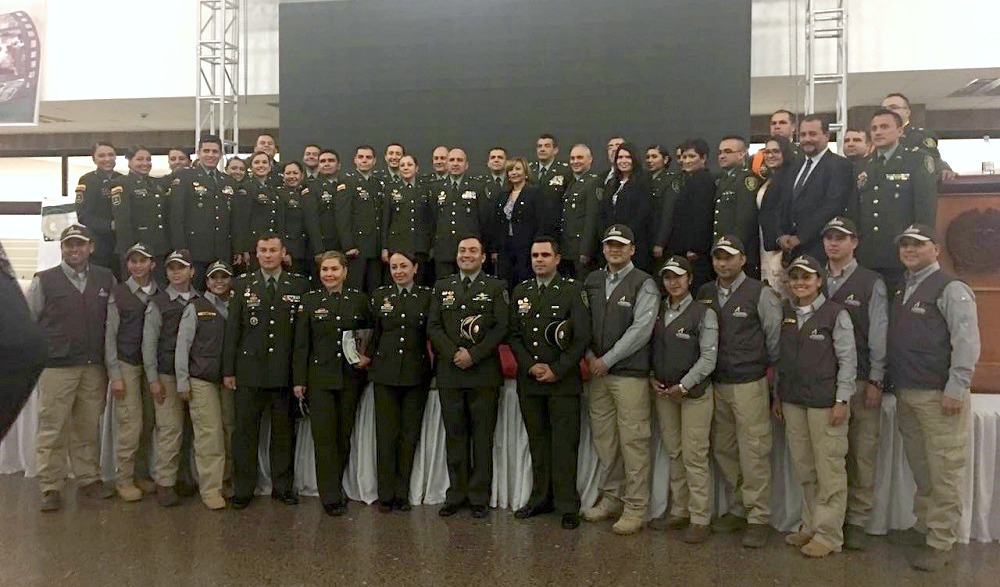
Launch of the Peacebuilding Model of the Colombian National Police. Bogotá, Colombia. Photo credit: Interpeace
Launch of the Peacebuilding Model
On Wednesday May 3, 2017, within the framework of the project "Strategic Peacebuilding Route for the Colombian National Police" implemented by Interpeace and Alianza para la Paz., UNIPEP gave a presentation of the work developed in its first year of management, which included the institutional presentation of the Peacebuilding Model of the Colombian National Police.
This event was chaired by Major General Jorge Hernando Nieto Rojas, Director of the National Police of Colombia, and was attended by different representatives and commissioners of Ministries, diplomats, public and private entities, among other guests.
In conflict-affected countries, access to independent information and news can be threatened by political and economic elites. In these contexts, manipulation of the media and stigmatization can create more division and mistrust between communities. To envision sustainable development and the possibility of lasting peace in these vulnerable contexts, support to free and professional media that enables democratic dialogue is a priority. Fostering an environment of trust through dialogue is a core objective of both Interpeace and Fondation Hirondelle, who have over forty years of combined experience promoting conflict resolution in fragile countries around the world.
On May 4, 2017 Interpeace signed a partnership with Fondation Hirondelle, to strengthen our collaboration working in societies affected by conflict. This partnership will create new and stronger alliances between journalists, researchers, peacebuilders and local communities, to jointly foster open dialogue and access to independent information, in order to help build more democratic and peaceful societies.
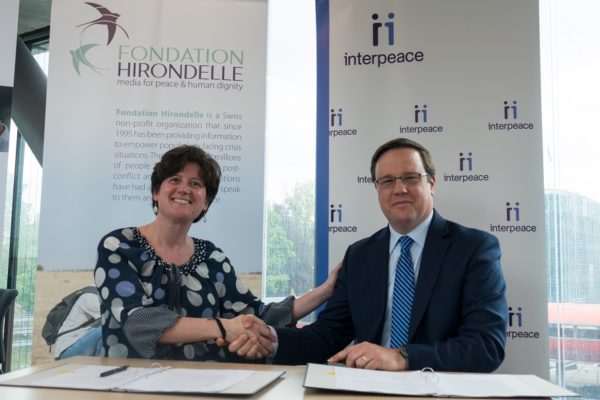
Caroline Vuillemin, Director-General of Fondation Hirondelle and Scott M. Weber, Director-General of Interpeace. Photo credit: ©Fondation Hirondelle/Fabian Jobin
As stated by Scott M. Weber, Director-General of Interpeace: “One of the key aspects of a more peaceful society is one where there is greater transparency and accountability of the authorities and of the information that is available.”
Fondation Hirondelle is a Swiss organization of journalists and humanitarian aid professionals, that creates and supports independent media in contexts facing crises, enabling citizens to hold their leaders and institutions accountable, as well as providing an open space to discuss and reflect on pressing issues. Meanwhile, Interpeace works to facilitate dialogue processes that allows all members of society to participate in transforming conflict. Therefore, by combining our experience and expertise, Interpeace and Fondation Hirondelle will seek to enhance the way people in vulnerable contexts generate and receive information.
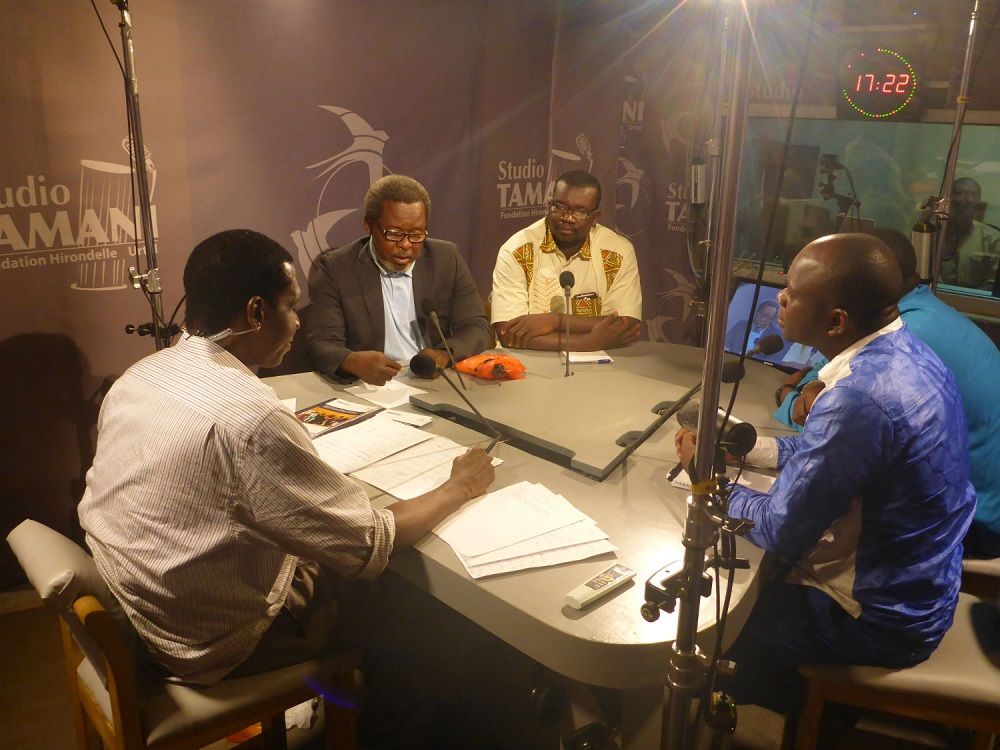
Studio Tamani in Mali. Photo credit: Fondation Hirondelle
Interpeace began working with Fondation Hirondelle in 2013 during the Malian crisis, to support the development of a national scale citizen dialogue. Together with our local partner the Malian Institute of Action Research for Peace (IMRAP), Interpeace launched a participatory and inclusive research process that involved almost 10,000 people across the country. This research was published in a reportage et un film called “Self-Portrait of Mali on the Obstacles to Peace.”
The results and lessons learned from this research were presented and discussed on the radio program Studio Tamani, which was created by Fondation Hirondelle, in partnership with Interpeace and supported by the European Union. Through this independent radio program, a culture of democratic debate began to emerge in Mali, where journalists, researchers and local actors exposed and informed the population of the major causes of crisis in the region and the possible solutions to build peace in the country.
Due to the success of this collaboration in Mali, Interpeace and Fondation Hirondelle will continue to work together, supporting regions in conflict build more democratic and inclusive societies. Caroline Vuillemin, Director-General of Fondation Hirondelle, describes: “With Interpeace working from the ground, bringing up solutions from the people and Hirondelle’s media in the country giving these messages a national reach and a wider audience, we can together act to promote and build lasting peace.”
A message from Caroline Vuillemin, Director-General of Fondation Hirondelle and Scott M. Weber, Director-General of Interpeace:























